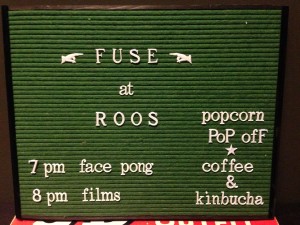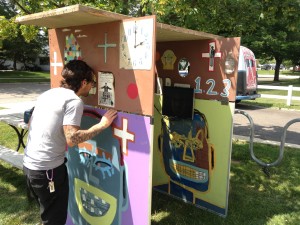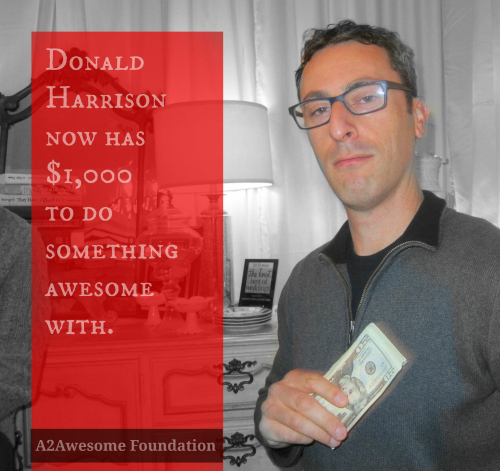A few days ago, the Ann Arbor Awesome Foundation handed over $1,000 in cash to local filmmaker Donald Harrison, who had applied for a grant in order to launch a new local film series. After our meeting, I took the opportunity to ask ask Donald a few questions about the local film scene, and his plans for FUSE: Mobile Microcinema…
MARK: So, what can you tell us about FUSE?
DONALD: Well, first off, thanks to A2 Awesome Foundation for the support to launch this series. Over the dozen years I’ve been making, screening and supporting independent films, I’ve gained a good sense for this landscape and a bad case of adventurous ideas. I view FUSE as a screening test lab, where we strip away many of the rules, expand our thinking, and focus on what’s fun, surprising and truly engaging in the realm of watching films together.
MARK: Would I be right to assume that this new series of yours is, as least to some extent, informed by your experience at the Ann Arbor Film Festival (AAFF), where, up until somewhat recently, you served as Director?
DONALD: My experiences with the AAFF certainly helped inspire my ideas for this series, along with the hundreds of other film screenings and events I’ve attended throughout the country. My interests with FUSE focus on more of a microcinema, community-centric level. This means an intimate venue, local pop-up vendors, opportunities for audience and artist interaction, and inviting participation in the support of the series through a more transparent model.
MARK: I don’t want to put you on the spot, but I want to follow up on the AAFF. At the 50th anniversary event, which took place a little over a year ago, there was a founders’ panel… Three or four people who helped launch the AAFF, back in the early 60s, came back, and you gave them an opportunity to reflect on the origins of the festival, and share their thoughts on what it had become. I don’t think I’m exaggerating when I say that they weren’t uniformly enthusiastic about the direction the festival had taken… Which I don’t think was terribly surprising… They were, after all, a rag tag band of rebels showing what were essentially illegal films on the U-M campus, to those on the cutting edge of the evolving counter culture movement, and, from their perspective, the festival had grown into something completely different – a much more corporate affair. I’m not asking you to validate their assessment, but, would you agree that we need to maybe bring back a little more of the grass roots? Or am I completely off base in thinking that FUSE is an attempt to do that?
DONALD: That was indeed a lively panel and discussion! The AAFF was certainly born of the sixties with a strong counter culture spirit. The fact that it evolved to survive is more a reflection on the changing times than anything else. How many 60s radicals and revolutionaries are still fighting the same fight in the same ways today and doing so effectively? The irony I find is that the AAFF is still one of the most risk-taking, non-commercial, experimentally focused film festivals in the country. It’s interesting to note that the actual founder of the AAFF, George Manupelli, unfortunately wasn’t able to join that panel as intended due to medical precautions. We added Leslie Raymond to the panel group, as she was very involved with the festival in the 90s and has a great perspective on its evolving with the times. She’s now the AAFF’s new Executive Director, and I’m looking forward to seeing where she guides it.
I don’t think the AAFF necessarily needs to be more grassroots. It’s currently a significant annual celebration of the art forms of film and new media. It’s a major event in superb venues (primarily the Michigan Theater) that requires year round dedication by its staff, board and supporters to properly pull together. During my stint with the AAFF, we dug deep to add more year round activities: 9-hour film contests with live improv musical scores, watching and reviewing entries at the library, backyard screenings, expansion of the traveling tour, Shadowbox Cinema (initially conceived for the Shadow Art Fair) which was a partnership with MOCAD and in some ways fed into my thinking for the FUSE series. I suppose that’s been an interest of mine for a while – creating opportunities to try out ideas, collaborate in communities and connect with audiences in more intimate settings. Now that I’m pursuing my own independent film projects and freelance video work, FUSE serves as a side project where I can contribute to our area’s continually evolving movie/media ecosystem.
 MARK: Is there a large enough audience for experimental film in the area to make a series like the one you have in mind viable? And, if not, how do you bring new people in?
MARK: Is there a large enough audience for experimental film in the area to make a series like the one you have in mind viable? And, if not, how do you bring new people in?
DONALD: Actually the focus of FUSE isn’t experimental films, though we’ll likely show something that some people would call experimental in the series. I consider the approach to the series as experimental, in many ways stripping out rules, making up new ones, and providing a test lab for ideas in programming, audience/artist interaction, and the model of a microcinema itself. By having a different collaborator for each FUSE event, I expect we’ll see the series grow in dynamic and surprising directions. I expect we’ll cross just about every genre and likely mash some of them together too. We’ll also experiment with different methods of outreach for each event, as it’s important to me that our audience doesn’t congeal with only one or two particular scenes.
MARK: What do you mean by “collaborators”? Are you referring to owners of the venues where you’ll be projecting? And, assuming you are, what will the extent of that collaboration be? Will they, for instance, be helping to select the material to be screened?
DONALD: Each FUSE event will have a different co-host who will collaborate with me to determine movies, structure to the event, outreach and any interactive ideas we conceive to try. While this co-host could be the venue owner, it’s most important that the series has enthusiastic collaborators with a unique perspective, an affinity to try out new ideas and the ability to get things done.
MARK: Clearly there are a few different opportunities here. First, it’s just good to have another venue for non-mainstream film. I mean, we used to have Forest in town, doing his Hott Lava thing, but, since he left, it doesn’t seem to me that there’s been much of a concerted effort to build an audience for this kind of material. And, second, there’s the possibility that you might actually stumble on a financial model that makes sense and can be replicated elsewhere, right?
DONALD: I feel there’s a shortage of grassroots spaces that make sense to host independent screenings, so it can seem like a steep curve for most to climb. I’ve been asked by many dozens of people about screening something at the Michigan Theater and, while they do rent out for special screenings, it’s just not often viable there. I’ve been working with John Roos to build a microcinema in his space, and I know of at least one other in the works, so perhaps we’ll see a resurgence in 2014. As for the model, I’d love to see this develop into something that provides a real mechanism for artists, organizers and audiences to all get value for their time. Many independent filmmakers feel exploited by exhibitors and many independent exhibitors are underfunded and overworked. So how do we fix it? I’m curious if we can draw on some elements of crowdsourcing, CSAs and collective ownership to help expand the triangle into something bigger and more sustainable. By documenting and publicly sharing the model of the series as it develops, there are certainly opportunities for others to see what works or at least learn from our mistakes.
 MARK: Walk me through a FUSE event… Where would I go to see the films? What kinds of films would I be seeing? How much would I pay? How would the revenues be shared between the filmmakers, the venue and the event organizer? And, how much transparency would I have, as a participant, into the whole process?
MARK: Walk me through a FUSE event… Where would I go to see the films? What kinds of films would I be seeing? How much would I pay? How would the revenues be shared between the filmmakers, the venue and the event organizer? And, how much transparency would I have, as a participant, into the whole process?
DONALD: Okay, picture this scenario Mark. It’s winter. You head over to Roos Roast (on Rosewood between Industrial & Packard). You walk in and the smell of coffee meets you right away. People are checking out pop-up concessions. There’s a fire in the wood burning stove. Music’s playing something strange and serene. There’s a VJ mixing aerial drone footage with Muppets episodes. No one’s dancing. People don’t dance at film events (unless they’re really drunk or high… up in the mountains).
The event begins. You’re told there’s no cover. Pay whatever you wish – nothing, ten, a hundred. Whatever is contributed, a third will go to the venue, a third split among the artists and a third to the organizers. The event’s cash total will be tallied and shared on the FUSE site, along with other details such as the number of people in attendance, the films shown, number of cell phones smashed that went off during movies, etc.
Then the lights go down. Maybe you’re handed a laser pointer and use it to help decide the order of the movies shown. You see, you listen, you think, you laugh, you yawn (not because of us, but because you work too damn much). Perhaps one movie has a live performer on banjo creating the soundtrack. Or one movie is a rough cut that the local filmmaker has not yet shown to an audience. For the final film, maybe the filmmaker Skypes in for a Q&A with us.
Each event will be uniquely created with different co-hosts trying out different ideas, so it won’t be the same formula every time. Fundamental to the FUSE series, though, will be an emphasis on making it fun, adventurous, and inviting more participation between the artists, audience and presenters.
MARK: I understand you’ve had one test screening. What did you learn from it?
DONALD: I affirmed that we needed to upgrade our projection equipment (thus the Awesome Foundation request)! And have more chairs – way more people showed up than I anticipated. But, even with our makeshift screening set-up, people were really into it – talking to the attending filmmakers and to each other. I find that having a more intimate, non-traditional screening space can often open people up so it’s less of a turnstile transaction and more of a community experience. I also affirmed that people will consider giving more (we got $72 from a pass the hat) if they have a good experience and learn more of the why and what they’re supporting.
MARK: You’ve mention Roos Roast a few times. As I understand it, though, you’re intention is also to travel with FUSE, taking it into different communities, and trying different kinds of venues. Can you share a few of your ideas along those lines?
DONALD: The first couple of FUSE events will take place in the microcinema space we’ve been building at Roos Roast. There are several factors that make it appealing, such as an installed screen, sound system, chairs, a wood burning stove, coffee and a ping pong table. One FUSE will likely take place outdoors next summer. And, once the series gets going, I’m sure I’ll connect with other potential venues that could serve as interesting locations, whether an auto repair shop, bowling alley, abandoned church or bookstore.
MARK: People, as you and I have discussed in the past, quite often aren’t willing to pay for the arts. People might not blink at paying $6 for a drink at a bar, but they’ll recoil at the thought of paying $5 at the same bar to see a band. How confident are you that FUSE can make headway in that regard, and actually deliver a meaningful amount of money to filmmakers?
DONALD: That’s a big topic – let’s discuss at the next FUSE, okay?!
MARK: OK, so when is the next FUSE event? And do you know yet what will be on the bill?
DONALD: I’m targeting February and May for the first two FUSE events – stay tuned!
[If you have an awesome idea that you think could get off the ground for $1,000, and make life in Ypsi-Arbor better, let us know about it. We give out $1,000 grants each and every month, and we'd love to hear what you could do with an A2 Awesome grant.]






















